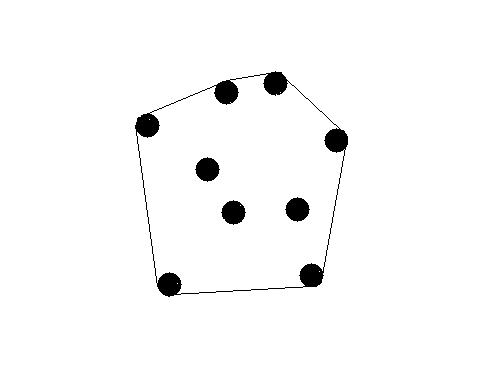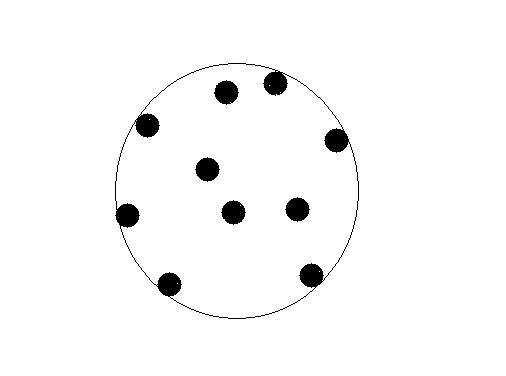Maple trees |
| Time Limit: 1000/1000 MS (Java/Others) Memory Limit: 32768/32768 K (Java/Others) |
| Total Submission(s): 222 Accepted Submission(s): 79 |
|
Problem Description
There are a lot of trees in HDU. Kiki want to surround all the trees with the minimal required length of the rope . As follow,
 To make this problem more simple, consider all the trees are circles in a plate. The diameter of all the trees are the same (the diameter of a tree is 1 unit). Kiki can calculate the minimal length of the rope , because it's so easy for this smart girl. But we don't have a rope to surround the trees. Instead, we only have some circle rings of different radius. Now I want to know the minimal required radius of the circle ring. And I don't want to ask her this problem, because she is busy preparing for the examination. As a smart ACMer, can you help me ?  |
|
Input
The input contains one or more data sets. At first line of each input data set is number of trees in this data set n (1 <= n <= 100), it is followed by n coordinates of the trees. Each coordinate is a pair of integers, and each integer is in [-1000, 1000], it means the position of a tree’s center. Each pair is separated by blank.
Zero at line for number of trees terminates the input for your program. |
|
Output
Minimal required radius of the circle ring I have to choose. The precision should be 10^-2.
|
|
Sample Input
2 1 0 -1 0 0 |
|
Sample Output
1.50 |
|
Author
zjt
|
|
Recommend
lcy
|
/* 题意:给你散落的点,让你求出最小的圆,将这些点围起来,点可以在圆上,输出圆的最小半径。 初步思路:求出凸包,然后在求出这个凸包的外接圆,两条边的垂直平分线的交点就是圆心 #错误:有点天真,三角形一定有外接圆,但是多边形不一定有外接圆 #改进:求出凸包,然后求凸包的最小覆盖圆,这个名词也是看到博客才知道了(呜呜呜,又少了 一次好好动脑的机会)然后任意的三个点组成的三角形的外接圆的最大半径就是就是凸包 “外接圆”的半径了,三角形的外接圆半径为abc/4s,这个公式能简单的证明。遍历出所有的半径,中间最长的半径 就是要求的半径。 #改进错误点:上面的情况只适用于锐角三角形,钝角,直角三角形的“外接圆”的最小半径,不是外接圆的半径,而是最长边的一半! */ #include<bits/stdc++.h> using namespace std; /****************************凸包模板*******************************/ const double eps = 1e-8; int sgn(double x) { if(fabs(x) < eps)return 0; if(x < 0)return -1; else return 1; } struct Point { double x,y; Point(){} Point(double _x,double _y) { x = _x;y = _y; } Point operator -(const Point &b)const { return Point(x - b.x,y - b.y); } //叉积 double operator ^(const Point &b)const { return x*b.y - y*b.x; } //点积 double operator *(const Point &b)const { return x*b.x + y*b.y; } void input(){ scanf("%lf%lf",&x,&y); } }; struct Line { Point s,e; Line(){} Line(Point _s,Point _e) { s = _s; e = _e; } }; //*两点间距离 double dist(Point a,Point b) { return sqrt((a-b)*(a-b)); } /* * 求凸包,Graham算法 * 点的编号0~n-1 * 返回凸包结果Stack[0~top-1]为凸包的编号 */ const int MAXN = 105; Point List[MAXN]; int Stack[MAXN];//用来存放凸包的点 int top;//表示凸包中点的个数 //相对于List[0]的极角排序 bool _cmp(Point p1,Point p2) { double tmp = (p1-List[0])^(p2-List[0]); if(sgn(tmp) > 0) return true; else if(sgn(tmp) == 0 && sgn(dist(p1,List[0]) - dist(p2,List[0])) <= 0) return true; else return false; } void Graham(int n) { Point p0; int k = 0; p0 = List[0]; //找最下边的一个点 for(int i = 1;i < n;i++) { if( (p0.y > List[i].y) || (p0.y == List[i].y && p0.x > List[i].x) ) { p0 = List[i]; k = i; } } swap(List[k],List[0]); sort(List+1,List+n,_cmp); if(n == 1) { top = 1; Stack[0] = 0; return; } if(n == 2) { top = 2; Stack[0] = 0; Stack[1] = 1; return ; } Stack[0] = 0; Stack[1] = 1; top = 2; for(int i = 2;i < n;i++) { while(top > 1 && sgn((List[Stack[top-1]]-List[Stack[top-2]])^(List[i]-List[Stack[top-2]])) <= 0) top--; Stack[top++] = i; } } /****************************凸包模板*******************************/ int n; int main(){ // freopen("in.txt","r",stdin); while(scanf("%d",&n)!=EOF&&n){ for(int i=0;i<n;i++){ List[i].input(); }//输入所有点坐标 if(n==1){ printf("0.50 "); continue; } if(n==2){ printf("%.2lf ",dist(List[0],List[1])/2+0.5); continue; } Graham(n);//求出凸包 double Maxr=-1.0; // cout<<top<<endl; //将Static[0]作为所有小三角形的公共顶点 for(int i=0;i<top;i++){//枚举三角形的点 for(int j=i+1;j<top;j++){ for(int k=j+1;k<top;k++){ /* 三条边的长度 */ double a=dist(List[Stack[i]],List[Stack[j]]); double b=dist(List[Stack[i]],List[Stack[k]]); double c=dist(List[Stack[k]],List[Stack[j]]); if(a*a+b*b<c*c||a*a+c*c<b*b||b*b+c*c<a*a){//判断是不是锐角三角形 Maxr=max(Maxr,max(max(a,b),c)/2); }else{ /* 三角形的面积 */ Point x1=List[Stack[j]]-List[Stack[i]]; Point x2=List[Stack[k]]-List[Stack[i]]; double s=fabs(x1^x2)/2; Maxr=max(Maxr,(a*b*c)/(4*s)); } } } } printf("%.2lf ",Maxr+0.5); } return 0; }